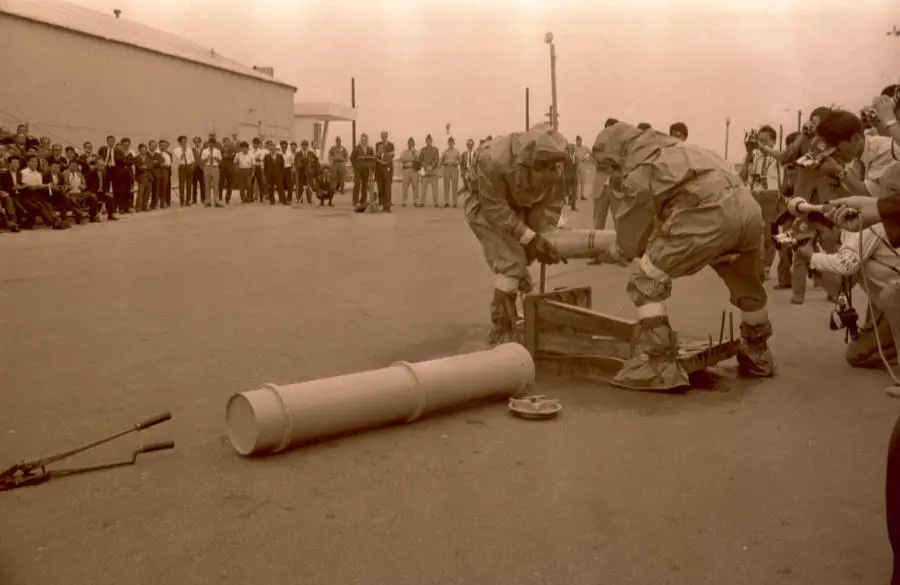Agent Orange: 17 Chilling Photos of the Vietnam War Crimes the US Got Away With

This article was first posted on Global Research in September 2017.
For ten years during the Vietnam War, the United States used a toxic concoction of two herbicides, labeled ‘Agent Orange,’ to wipe out large areas of Vietnam which were covered by thick jungle. The aim was to enable easier and more effective bombing of enemy bases. The issue was, Agent Orange wasn’t just an herbicide — it was also a deadly weapon, as it contains large amounts of dioxin.
Agent Orange was discovered in the year 1943 by American botanist Arthur Galston. Between the years of 1962 and 1971, the US army “showered” the deadly chemical over Southern Vietnam as part of the military operation “Ranch Hand”, or “Trail Dust.” In total, more than 20 million gallons of Agent Orange was used. Sadly, Agent Orange did more than contribute to the deforestation of vast areas of land. It also contaminated air, water, and food sources.
History Rundown reports that in high concentrations, dioxin can trigger severe inflammation of the skin, lungs and mucous tissues. Sometimes, the toxicity can result in chronic obstructive pulmonary disease, pulmonary edema, and even death. The highly effective carcinogen is also known to affect the eyes, liver, and kidneys, and to cause laryngeal and lung cancer.
As a result of using Agent Orange during the Vietnam War, more than 400,000 people were killed or maimed, and at least 500,000 children were born with mild to severe birth defects. Additionally, 5 million acres of forests and millions more of farmland were destroyed. Agent Orange is said to have killed 10 times more people than all chemical weapons combined.
Because the United States didn’t “technically” violate international laws, as it signed defense treaties with Southern Vietnam’s government and its actions (for the most part) were in line with the defense treaties, there was no reprimand for using Agent Orange as a chemical weapon during the war. That doesn’t mean hundreds of thousands didn’t suffer — or continue to today.
Today, many Agent Orange victims live in Peace Villages, communities where workers care for them and try to give them a normal life. However, “normal” will never truly be possible for most, as mutations caused by Agent Orange still affect the people and the children of Vietnam. As AllThatIsInteresting reports, those who can live in Peace Village are luckier than some of their siblings. Reportedly, some victims of the chemical agent are too deformed to even survive childbirth.
“There is a room at the hospital which contains the preserved bodies of about 150 hideously deformed babies, born dead to their mothers,” one charity worker said. “Some have two heads; some have unbelievably deformed bodies and twisted limbs. They are kept as a record of the terrible consequences of chemical weaponry.”
Veterans who served in the Vietnam war, as well, returned to US soil reporting unusually high rates of lymphoma, leukemia, and cancer. The rates were highest among those who worked with Agent Orange directly.
Following are haunting images from the war crime the US got away with:
1) Three planes fly over Vietnam releasing chemicals.

Vietnam. Circa 1961-1971. Credit: Wikimedia Commons
2) An aerial photograph showing the effects of Agent Orange. The land on the left hasn’t been sprayed while the land on the right has.

Vietnam. Circa 1961-1971. Credit: Admiral Elmo R. Zumwalt, Jr. Collection: Agent Orange Subject Files/The Vietnam Center and Archive/Texas Tech University
3) Not all of the chemicals were sprayed from above. These soldiers are spraying crops from atop a vehicle, getting up close and personal with the dangerous chemicals.

Vietnam. Circa 1961-1971. Credit: Admiral Elmo R. Zumwalt, Jr. Collection: Agent Orange Subject Files/The Vietnam Center and Archive/Texas Tech University
4) A ten-year-old girl born without arms writes in her schoolbook.

Ho Chi Min City, Vietnam. December 2004. Credit: Wikimedia Commons
5) Soldiers down below help spray Agent Orange on the jungle, getting a dangerous dose of the chemicals all over their skins in the process.

Vietnam. Circa 1961-1971. Credit: Admiral Elmo R. Zumwalt, Jr. Collection: Agent Orange Subject Files/The Vietnam Center and Archive/Texas Tech University
6) 55-year-old Kan Lay holds her 14-year-old son, born with severe physical disabilities because of Agent Orange.

A Lưới, Vietnam. August 6, 2013. Credit: Wikimedia Commons
7) A soldier, after spraying the land with Agent Orange, tries to wash himself clean in some of the very waters that he had helped pollute.

Vietnam. Circa 1961-1971. Credit: Admiral Elmo R. Zumwalt, Jr. Collection: Agent Orange Subject Files/The Vietnam Center and Archive/Texas Tech University
8) A helicopter sprays Agent Orange.

Vietnam. Circa 1961-1971. Credit: Admiral Elmo R. Zumwalt, Jr. Collection: Agent Orange Subject Files/The Vietnam Center and Archive/Texas Tech University
9) Lt. Kathleen Glover comforts an orphaned Vietnamese child.

After the war, Lt. Glover would come home and find out that she had contracted Non-Hodgkin’s Lymphoma from her exposure to Agent Orange. Vietnam. Circa 1961-1971. Credit: RADM Frances Shea Buckley Collection/The Vietnam Center and Archive/Texas Tech University
10) A man begs for money outside of a cathedral. He was born with a deformed arm because of Agent Orange, and it makes it nearly impossible for him to find work.

Ho Chi Minh City, Vietnam. June 1, 2009. Credit: Wikimedia Commons
11) A group of American planes fly over top of the jungles and release chemicals meant to kill the trees underneath

Vietnam. Circa 1961-1971. Credit: Wikimedia Commons
13) A helicopter sprays Agent Orange on Vietnamese farmland.

Mekong River, Vietnam. July 26, 1969. Credit: Wikimedia Commons
14) A massive stack of 55-gallon drums full of Agent Orange waits to be poured over the people of Vietnam.

Location unspecified. Circa 1961-1971. Credit: Wikimedia Commons
15) Military personnel demonstrate how to handle an Agent Orange leak, apparently growing increasingly aware of how dangerous the chemical they’d been using really is.

Okinawa, Japan. May 11, 1971. Credit: Wikimedia Commons
16) Professor Nguyen Thi Ngoc Phuong poses for a photo with the handicapped children under her care. Every one of them was born with a defect caused by Agent Orange.

Ho Chi Minh City, Vietnam. December 2004. Credit: Wikimedia Commons
17) The third-generation child of an Agent Orange victim. Despite the generations between him and the Vietnam War, this boy still feels the effects and lives in a special village for Agent Orange victims.

Hanoi, Vietnam. November 10, 2007. Credit: A. Strakey/Flickr

